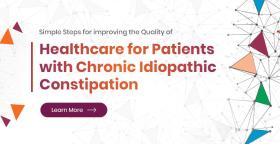
Simple Steps for Improving the Quality of Healthcare for Patients with Chronic Idiopathic Constipation
You’ve taken the first step for you and your practice to achieve measurable changes that will improve your patients’ chronic idiopathic constipation (CIC) experiences and outcomes.
To ensure your patients with CIC receive timely, appropriate interventions and the best possible care, clinicians need to better distinguish CIC from similar conditions. In addition, working together, clinicians and patients can make better choices among the many treatment options through shared decision-making (SDM) strategies to help achieve treatment goals.
This digital format provides a brief questionnaire to capture your current practices and delivers a personalized summary, including recommended practical tools and educational interventions for rollout in primary care and specialty settings, including:
- Clinical diagnostic tools (based on diagnostic criteria)
- Patient communication and education resources
- Checklists for creating alerts and process changes
Using this simple, systematic approach to quality improvement, intended for easy access and application in any practice setting, you will have the framework and tools you need to help your patients recognize and manage CIC and ensure that they receive timely and appropriate interventions. So, let’s get started!
Clinicians who participate in the digital QI program are eligible for MOC credit.
Educational Partner: Academy for Continued Healthcare Learning (ACHL)
Medium: Digital QI
Commercial Support: Supported by an educational grant from Takeda Pharmaceuticals U.S.A., Inc.
Target Audience
This activity is intended for HCPs who treat CIC including gastroenterologists, PCPs, and the multidisciplinary team.
Learning Objectives
At the conclusion of this activity, participants will be able to:
- Differentiate CIC from other disorders with overlapping symptoms;
- Identify the mechanisms of action as well as clinical and real-world evidence with the available CIC agents;
- Formulate individualized treatment regimens for patients with CIC;
- Incorporate meaningful communication and SDM into the management of CIC.
Activity opens:
12/20/2023
Activity expires:
12/19/2025
FACULTY
 Brooks Cash, MD, AGAF, FACG, FACP, FASGE
Brooks Cash, MD, AGAF, FACG, FACP, FASGEProfessor of Medicine
University of Texas McGovern Medical School
Chief, Division of Gastroenterology, Hepatology, and Nutrition
University of Texas Health Science Center at Houston
Houston, TX
 Lucinda Harris, MS, MD
Lucinda Harris, MS, MDProfessor of Medicine
Division of Gastroenterology and Hepatology
Mayo Clinic Alix School of Medicine
Scottsdale, AZ
Disclosure Declarations
As a provider accredited by the ACCME, The University of Chicago Pritzker School of Medicine asks everyone in a position to control the content of an education activity to disclose all financial relationships with any ineligible companies. This includes any entity whose primary business is producing, marketing, selling, re-selling, or distributing healthcare products used by or on patients. Financial relationships are relevant if a financial relationship, in any amount, exists between the person in control of content and an ineligible company during the past 24 months, and the content of the education is related to the products of an ineligible company with whom the person has a financial relationship. Mechanisms are in place to identify and mitigate any relevant financial relationships prior to the start of the activity.
Additionally, The University of Chicago Pritzker School of Medicine requires Authors to identify investigational products or off-label uses of products regulated by the US Food and Drug Administration at first mention and where appropriate in the content.
Physician Credit
The University of Chicago Pritzker School of Medicine is accredited by the Accreditation Council for Continuing Medical Education (ACCME) to provide continuing medical education for physicians.
The University of Chicago Pritzker School of Medicine is accredited by the Accreditation Council for Continuing Medical Education (ACCME) to provide continuing medical education for physicians.
The University Of Chicago Pritzker School Of Medicine designates this enduring activity for a maximum of 4 AMA PRA Category 1 Credits™. Physicians should claim only the credit commensurate with the extent of their participation in the activity.
Other Healthcare Professional Credit
Other healthcare professionals will receive a Certificate of Participation. For information on the applicability and acceptance of Certificates of Participation for educational activities certified for AMA PRA Category 1 Credit™ from organizations accredited by the ACCME, please consult your professional licensing board.
Other healthcare professionals will receive a Certificate of Participation. For information on the applicability and acceptance of Certificates of Participation for educational activities certified for AMA PRA Category 1 Credit™ from organizations accredited by the ACCME, please consult your professional licensing board.
Successful completion of this CME activity, which includes participation in the evaluation component, enables the participant to earn up to 4.0 MOC points in the American Board of Internal Medicine’s (ABIM) Maintenance of Certification (MOC) program. It is the CME activity provider’s responsibility to submit participant completion information to ACCME for the purpose of granting ABIM MOC credit.
By providing your ABIM Diplomate number, you consent to have the University of Chicago Pritzker School of Medicine and/or ACHL submit your participation in this activity to the ABIM through the ACCME PARS system. ABIM credit will be submitted to PARS within 30 days of participation.
Completion of this activity, including the pretest, posttest, and follow-up assessments, qualifies as a medium weight MIPS improvement activity under MACRA and can be claimed as completion of IA_PSPA 28 of an Accredited Safety or Quality Improvement Program in the Quality Payment Program. Clinicians should submit their improvement activities by attestation via the CMS Quality Payment Program website. You will receive additional information after completing the activity and receiving your certificate via email.
Registration: To view this activity, you will need to visit ACHL's website.
Click here to view the activity or if you are logged in click on the "Complete Activity" button!
Click here to view the activity or if you are logged in click on the "Complete Activity" button!
Please login or create an account to proceed.

 Facebook
Facebook X
X LinkedIn
LinkedIn Forward
Forward